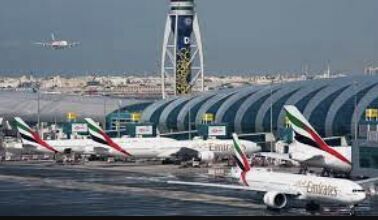Dubai Takes Flight: Al Maktoum International Set to Replace Busy Dubai International Airport by 2030s
Dubai plans to replace its busy Dubai International Airport with Al Maktoum International, a larger and more advanced facility, by the 2030s to accommodate increasing passenger traffic.
Dubai is set to replace its busiest airport, Dubai International, with a larger and more advanced facility called Al Maktoum International Airport. The new airport, which will be built on the outskirts of the city, is expected to be operational in the 2030s and will cater to the increasing passenger traffic. Paul Griffiths, the CEO of Dubai Airports, announced that designs for the new airport are currently being drawn up.
Griffiths explained that once Dubai International reaches its maximum capacity of around 120 million passengers per year, a new airport will be necessary. He also mentioned that neighboring Saudi Arabia has already announced plans for a major air hub in Riyadh. Despite this, Griffiths expressed confidence in the industry's trajectory and highlighted the robust recovery from the pandemic. Figures show that Dubai International is expected to surpass its 2019 traffic, with projected passenger numbers of 86.9 million in 2023. Interestingly, the recent conflict between Israel and Hamas in Gaza has had very little impact on passenger numbers.
Griffiths noted that some regions even experienced stronger traffic than before, dismissing concerns about potential repercussions on regional economies and tourism. He attributed the quick recovery to the pent-up demand for travel after being under lockdown for two years. Dubai airport was temporarily closed for commercial flights from March to July 2020 due to the pandemic. However, it was one of the first travel hubs to reopen and resume operations. In 2020, the airport saw a significant decrease in passenger numbers, handling only 25.9 million travelers compared to 86 million in 2019.
The new airport, Al Maktoum International, is expected to be even larger and better than Dubai International. It will be designed on a modular basis, allowing for easy expansion over time. Griffiths emphasized that the airport of the future will have a different business model, focusing on creating a more intimate and efficient experience for customers. The project is expected to extend well into the 2050s, reflecting Dubai's long-term approach.




